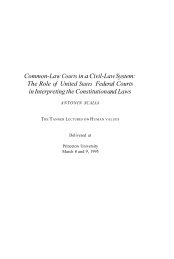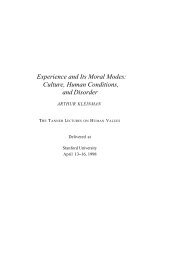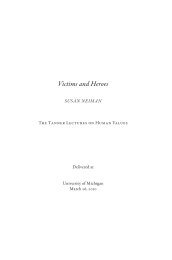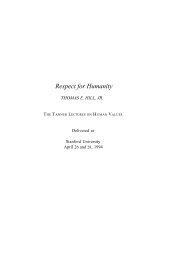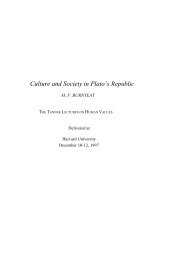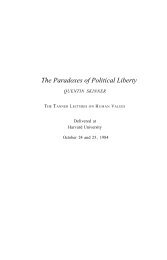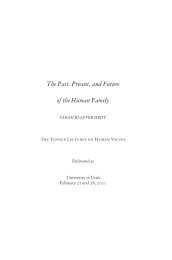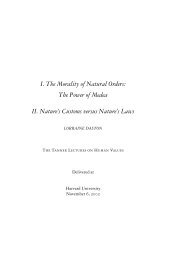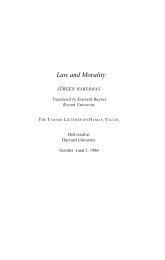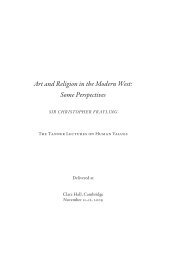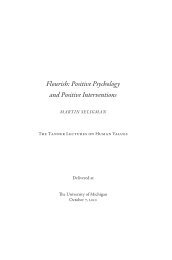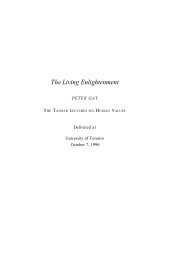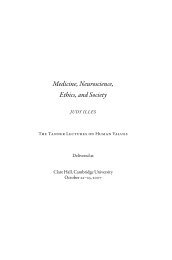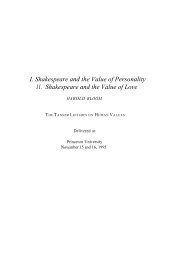Muguerza, Javier - The Tanner Lectures on Human Values
Muguerza, Javier - The Tanner Lectures on Human Values
Muguerza, Javier - The Tanner Lectures on Human Values
You also want an ePaper? Increase the reach of your titles
YUMPU automatically turns print PDFs into web optimized ePapers that Google loves.
[MUGUERZA] <str<strong>on</strong>g>The</str<strong>on</strong>g> Alternative of Dissent 81undoubted ethical pathos of his thought,14 even though Blochnever speaks there of “ethics,” but always of “natural law,” perhaps,it seems to me, because, in the Marxist traditi<strong>on</strong>, it is easierto fly in the teeth of Marx’s “prejudices” about human rights 15than to overcome the embarrassment, disguised as akribeia, thatkept him and his followers from acknowledging that at timeswhat he was doing was simply ethics.For my part I would say, in synthesis, that the “demands” ofdignity, liberty, and equality included in Pérez Luño’s definiti<strong>on</strong>of human rights - demands that, according to his definiti<strong>on</strong>,“ought to be” legally recognized - are “moral demands,” and Iwould add that they should be awarded full status as human rightswhen they have passed the extra test of their legal recogniti<strong>on</strong>. Inmy case, I am not sure such a coarse and crude duality would bewillingly accepted under the banner of the highly regarded “dualtheory” of those rights. 16 Like all dualisms that are too abrupt,perhaps mine too gives the impressi<strong>on</strong> of suffering from an obviousschizophrenia, the same <strong>on</strong>e - c<strong>on</strong>sisting of separatingmorality and legality - that Hegel <strong>on</strong>ce accused Kant of, followingwhich he reduced ethics, now changed to “ethicity,” to hisphilosophy of law (which, in any case, proves that Kant’s schizophreniais preferable to Hegel’s paranoia, which was capable ofswallowing up and “going bey<strong>on</strong>d” in his philosophical systemwhat Hegel was in the habit of referring to disdainfully as “mere14E. Bloch, Naturrecht und menschliche Wiirde, Gesamtausgabe, vol. 6 (Frank-furt am Main, 1961).1983).15 See in this regard Manuel Atienza, Marx y los derechos humanos (Madrid,16 <str<strong>on</strong>g>The</str<strong>on</strong>g> “dualistic c<strong>on</strong>cepti<strong>on</strong>” of human rights, which - as opposed to jusnaturalistsand juspositivists - attempts to “integrate” their c<strong>on</strong>diti<strong>on</strong> as “values”(prior to their recogniti<strong>on</strong> in any legal text) with their c<strong>on</strong>diti<strong>on</strong> as valid “legalnorms” (<strong>on</strong>ce legally recognized), has been maintained by Gregorio Peces-Barba inhis Derechos fundamentales (Madrid, 1983), 24-27, 28ff.; in c<strong>on</strong>necti<strong>on</strong> with oursubject see also, by the same author, Introducción a la filosofía del derecho (Madrid,1983), esp. 305-30; Los valores superiores (Madrid, 1984); and Escritos sobrederechos fundamentales (Madrid, 1988), esp. 215-26.



